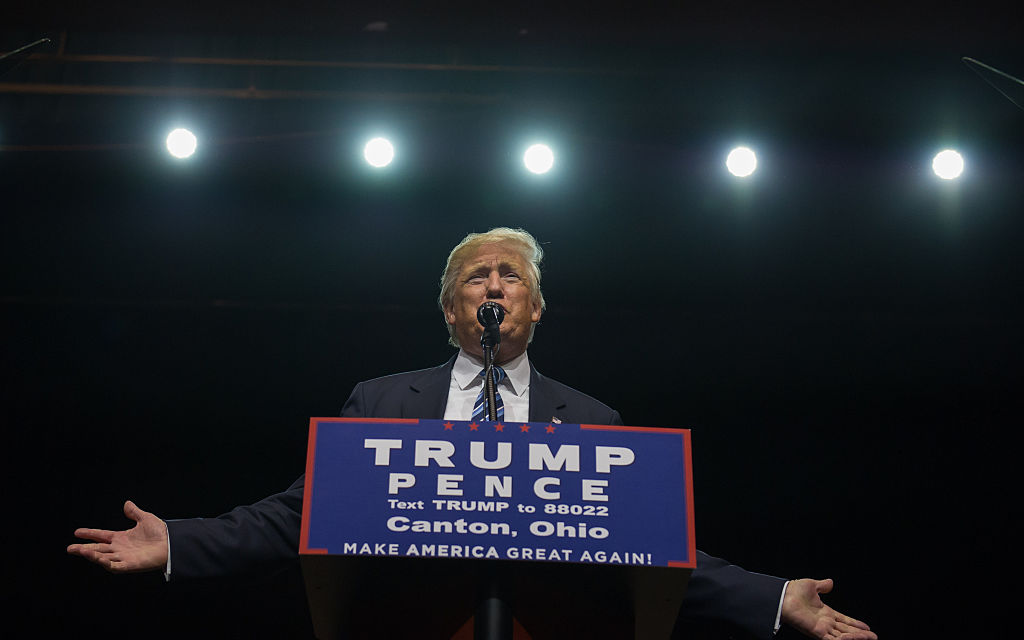Donald Trump is reportedly 'the least transparent U.S. presidential candidate in modern history'


A free daily email with the biggest news stories of the day – and the best features from TheWeek.com
You are now subscribed
Your newsletter sign-up was successful
If Ronald Reagan popularized the dictum "trust, but verify," Donald Trump's maxim might be described as "trust me, and I might verify at some future date." When a Trump lawyer assured everyone on Wednesday that Melania Trump had not skirted U.S. immigration laws, for example, he provided no evidence and raised new questions about her green card. And when Trump released a four-paragraph letter last December testifying to his "astonishingly excellent" health, the letter contained almost no details. Trump will presumably fill out his heath picture some when he appears on the Dr. Oz TV show on Thursday — the teaser for the show, taped Wednesday, shows Trump handing Dr. Mehmet Oz two sheets of paper, then cuts out.
"Despite these high-profile gestures, Trump remains the least transparent major presidential nominee in modern history," say Jenna Johnson and Mary Jordan at The Washington Post. The article — it isn't an op-ed or opinion column — cites Trump's refusal to release his tax returns, or document his "tens of millions" of dollars to charity, or show evidence that the fast-food-loving 70-year-old is as healthy as he claims to be. The article notes the irony:
At the same time, Trump and his aides are criticizing rival Hillary Clinton as secretive and demanding more information from her about her emails and health. Many Democrats also see Trump's refusal to release basic information as hypocritical since for years, he was one of the loudest voices demanding that President Obama release his birth certificate to prove he was born in Hawaii and qualified to be president. Trump also called on Obama to release his college applications, school transcripts and passport applications. [The Washington Post]
Read more — including Melania Trump's apparent success getting U.S. residency under the "Einstein category" — at The Washington Post.
The Week
Escape your echo chamber. Get the facts behind the news, plus analysis from multiple perspectives.

Sign up for The Week's Free Newsletters
From our morning news briefing to a weekly Good News Newsletter, get the best of The Week delivered directly to your inbox.
From our morning news briefing to a weekly Good News Newsletter, get the best of The Week delivered directly to your inbox.
A free daily email with the biggest news stories of the day – and the best features from TheWeek.com
Peter has worked as a news and culture writer and editor at The Week since the site's launch in 2008. He covers politics, world affairs, religion and cultural currents. His journalism career began as a copy editor at a financial newswire and has included editorial positions at The New York Times Magazine, Facts on File, and Oregon State University.
-
 Tourangelle-style pork with prunes recipe
Tourangelle-style pork with prunes recipeThe Week Recommends This traditional, rustic dish is a French classic
-
 The Epstein files: glimpses of a deeply disturbing world
The Epstein files: glimpses of a deeply disturbing worldIn the Spotlight Trove of released documents paint a picture of depravity and privilege in which men hold the cards, and women are powerless or peripheral
-
 Jeff Bezos: cutting the legs off The Washington Post
Jeff Bezos: cutting the legs off The Washington PostIn the Spotlight A stalwart of American journalism is a shadow of itself after swingeing cuts by its billionaire owner
-
 ABC News to pay $15M in Trump defamation suit
ABC News to pay $15M in Trump defamation suitSpeed Read The lawsuit stemmed from George Stephanopoulos' on-air assertion that Trump was found liable for raping writer E. Jean Carroll
-
 Judge blocks Louisiana 10 Commandments law
Judge blocks Louisiana 10 Commandments lawSpeed Read U.S. District Judge John deGravelles ruled that a law ordering schools to display the Ten Commandments in classrooms was unconstitutional
-
 ATF finalizes rule to close 'gun show loophole'
ATF finalizes rule to close 'gun show loophole'Speed Read Biden moves to expand background checks for gun buyers
-
 Hong Kong passes tough new security law
Hong Kong passes tough new security lawSpeed Read It will allow the government to further suppress all forms of dissent
-
 France enshrines abortion rights in constitution
France enshrines abortion rights in constitutionspeed read It became the first country to make abortion a constitutional right
-
 Texas executes man despite contested evidence
Texas executes man despite contested evidenceSpeed Read Texas rejected calls for a rehearing of Ivan Cantu's case amid recanted testimony and allegations of suppressed exculpatory evidence
-
 Supreme Court wary of state social media regulations
Supreme Court wary of state social media regulationsSpeed Read A majority of justices appeared skeptical that Texas and Florida were lawfully protecting the free speech rights of users
-
 Greece legalizes same-sex marriage
Greece legalizes same-sex marriageSpeed Read Greece becomes the first Orthodox Christian country to enshrine marriage equality in law
